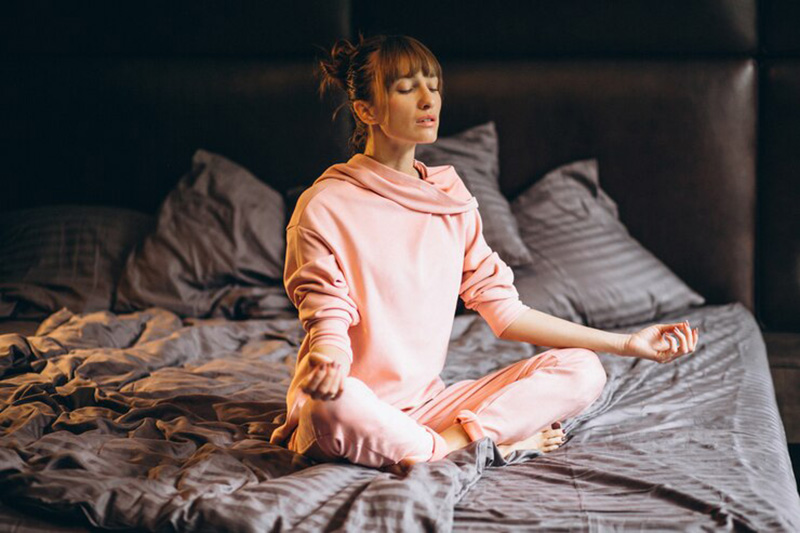Imagine greeting every sunrise with a spring in your step, your mind completely clear, and your energy levels fully charged for the day’s pursuits. A good night’s sleep is not a luxury – it is a necessity. Yet, many of us battle restlessness, insomnia, or interrupted sleep that steals from our morning enthusiasm. Want to change that? Read on and discover the effective tips and tricks to help you regain control over your sleep patterns, wake up refreshed every day, and ultimately improve your quality.
To get a good night’s sleep and wake up feeling refreshed, it is important to establish a regular sleep schedule and create a comfortable sleeping environment. Other tips include avoiding caffeine and alcohol close to bedtime, exercising regularly during the day, and practicing relaxation techniques before bed. Additionally, it may be helpful to limit screen time before bed and seek medical evaluation if experiencing symptoms of restless legs syndrome or sleep apnea.
Healthy Bedtime Routines
Establishing a healthy bedtime routine is crucial for promoting quality sleep and waking up feeling refreshed. By incorporating certain habits into our evening rituals, we can signal to our bodies that it’s time to wind down and prepare for restful sleep. Here are some tips to help you create a healthy bedtime routine:
- Screen-free hour: Starting an hour before bed, avoid electronic devices such as smartphones, tablets, and laptops. The blue light emitted by these screens can interfere with the production of melatonin, a hormone that regulates sleep.
- Relaxation techniques: Engage in relaxing activities to calm your mind and body before sleep. Consider practices like reading a book, taking a warm bath, practicing deep breathing exercises, or listening to soothing music.
- Limit caffeine and alcohol intake: Avoid consuming caffeine or alcohol close to bedtime, as they can disrupt sleep patterns. Opt for herbal tea or water instead.
- Consistent sleep schedule: Try to go to bed and wake up simultaneously every day, even on weekends. This helps regulate your body’s internal clock and encourages better sleep quality.
- Create a calming environment: Make your bedroom a sleep-friendly space by keeping it dark, cool, quiet, and comfortable. Invest in blackout curtains or an eye mask if needed, use earplugs or a white noise machine to block out disruptive noises, and ensure your mattress and pillows are supportive.
Picture this: You dim the lights, play soft music in the background, and engage in a relaxing pre-sleep activity like reading a book under cozy blankets while sipping on chamomile tea – all in a serene bedroom environment conducive to relaxation. Such routines help cue your mind and body that it’s time for restful slumber.
Learn More: Can You Take Too Many Probiotics?
Ideal Sleep and Wake-Up Times
While individual sleep needs may vary, establishing consistent sleep and wake-up times can benefit your overall well-being. Here are some general guidelines to consider:
- Aim for 7-9 hours of sleep: As a starting point, most adults require 7-9 hours of quality sleep each night to function optimally. However, it’s important to listen to your body and adjust this range based on how you feel during the day.
- Consider your circadian rhythm: Your body operates on an internal clock known as the circadian rhythm, which regulates sleep-wake cycles. Ideally, align your sleep schedule with your natural rhythm for optimal restfulness.
Imagine your circadian rhythm as a conductor leading a symphony orchestra. When you synchronize your sleep schedule with this internal clock, it’s like playing harmoniously with the music, resulting in better sleep quality.
- Find a balance: Experiment with different sleep and wake-up times until you find a routine that allows you to wake up refreshed and energized without relying heavily on caffeinated beverages or feeling excessively tired during the day.
For instance, if waking up at 7 a.m. gives you enough time to complete your morning routine and start the day without feeling rushed or fatigued, aim to go to bed around 10 or 11 p.m. to ensure a sufficient amount of sleep.
Certain individuals might have unique requirements due to age or specific health conditions. It’s always best to consult with a healthcare professional if you have concerns about your sleep needs.
Optimal Sleep Environment
Creating an optimal sleep environment can improve your sleep quality and overall well-being. The environment in which you sleep plays a significant role in regulating your body’s circadian rhythm and promoting relaxation. Here are some tips to help you create the perfect sleep environment:
Keep it cool: A slightly cooler room temperature, around 65-68 degrees Fahrenheit (18-20 degrees Celsius), is often ideal for most people. Cooler temperatures promote better sleep by helping to lower your core body temperature.
Make it dark: Darkness signals your body to produce melatonin, the hormone that regulates sleep. Invest in blackout curtains or blinds to block out external light sources such as streetlights or early morning sunlight. You could also use a sleep mask if making the room completely dark is impossible.
Eliminate noise: Excessive noise can disrupt your sleep and prevent you from reaching deep, restorative stages of sleep. Use earplugs, a white noise machine, or a fan to mask disturbing sounds and create a peaceful environment. Some people find soothing background sounds like rainfall or gentle waves helpful inducing sleep.
Ensure comfort: Your sleeping surface should provide adequate support and comfort. Evaluate your mattress and pillows to ensure they are appropriate for your needs. If they are old and worn out, consider investing in new ones that provide proper spinal alignment and cushioning.
Think of your sleep environment as the stage where the magic of sleep happens. Just as performers need the right setting to deliver a captivating show, you need the right environment to enjoy rejuvenating slumber.
Creating a Comfortable Bed
Your bed is vital in ensuring a comfortable and restful night’s sleep. Let’s explore some factors that contribute to creating a comfortable bed:
Choose the right mattress: The mattress you sleep on should provide appropriate support for your body, keeping your spine aligned and relieving pressure points. There are various types of mattresses available, such as memory foam, latex, or hybrid options. Take the time to research and try different mattresses to find one that suits your preferences and sleeping style.
Invest in quality bedding: Your sheets, blankets, and pillows all contribute to your overall comfort. Opt for high-quality, breathable materials that help regulate temperature and wick away moisture, such as cotton or bamboo fabrics. Choose pillows that align with your preferred sleep position and offer adequate neck support.
Keep it clean: Regularly laundering your bedding ensures freshness and removes allergens that can disrupt sleep. Wash your sheets, pillowcases, and blankets at least once a week. Don’t forget to fluff up your pillows regularly to maintain their shape and support.
Personalize it: Experiment with different bedding textures, colors, and patterns that create a cozy and inviting atmosphere for sleep. Making your bed a space that reflects your style can enhance comfort and relaxation.
Remember that creating a comfortable bed is not just about aesthetics; it directly impacts the quality of your sleep. A well-crafted sleep environment sets the stage for restorative rest and helps you wake up refreshed each morning.
Learn More: Probiotics 101: What Are They and How They Benefit Your Gut Health
Physical Activity and Sleep Quality
Engaging in regular physical activity is not only beneficial for our overall health but also plays a significant role in improving sleep quality. When we are physically active, our bodies release endorphins, which promote feelings of relaxation and well-being. This can contribute to a more restful sleep experience.
The Stress-Reduction Effect
One of the key ways that physical activity improves sleep quality is by reducing stress and anxiety. Exercise helps to regulate cortisol levels, a hormone associated with stress, by releasing excess energy and tension. When we are less stressed, it becomes easier to fall asleep and stay asleep throughout the night.
Body Temperature and Sleep
Moreover, physical activity increases our body temperature during exercise and lowers it during recovery. This drop in body temperature post-exercise signals to the body that it is time to sleep. By creating this natural temperature change, we can enhance our ability to fall asleep quickly and achieve deep, uninterrupted sleep cycles.
Now that we have explored the connection between physical activity and sleep quality let’s dive into some of the specific benefits of exercise in improving sleep.
Benefits of Exercise on Sleep
Regular exercise has numerous benefits for our overall health, including weight management, improved cardiovascular health, and increased muscle strength. However, one often overlooked advantage of exercise is its positive impact on sleep.
A Solution for Insomnia
For individuals who struggle with insomnia or have difficulty falling asleep at night, engaging in regular exercise can be a game-changer. Consistent exercise can reduce the time it takes to fall asleep and improve overall sleep quality. For example, research published in the Journal of Clinical Sleep Medicine found that adults who engaged in moderate-intensity aerobic exercises saw a significant improvement in their self-reported sleep quality.
Addressing Sleep Disorders
Exercise also has a positive effect on individuals experiencing symptoms of sleep disorders such as obstructive sleep apnea or restless legs syndrome. In particular, studies have shown that exercise can reduce the severity and frequency of sleep apnea episodes and decrease symptoms of restless legs syndrome, leading to better sleep outcomes.
Exercise as a Natural Sleep Aid
Think of exercise as a natural sleep aid without any of the potential side effects that come with medication. Just like a cup of chamomile tea can help calm your nerves before bed, engaging in physical activity can improve your sleep quality.
Now, you might be wondering if it matters what time of day you exercise. While any physical activity benefits sleep, some individuals find that exercising too close to bedtime can leave them feeling energized and make it harder to fall asleep. On the other hand, others find that a late-night workout helps tire them out and promotes better sleep. It ultimately depends on your body’s response to exercise and what works best for you. Experiment with different times of the day to find your sweet spot.
Learn More: Do Women’s Probiotics Trigger Diarrhea?
Nutrition for Better Sleep and Morning Energy
Getting a good night’s sleep and waking up refreshed is not just about the hours spent in bed; it also involves taking care of your body’s nutritional needs. What you eat can greatly impact the quality of your sleep and your energy levels when you wake up. Let’s delve into some important aspects of nutrition that can contribute to better sleep and morning energy.
Nutrients for Sleep
First and foremost, it’s crucial to maintain a balanced and nutritious diet throughout the day. Avoid skipping meals or consuming sugary snacks and caffeinated beverages for energy boosts, especially in the evening. These can disrupt your sleep patterns and make it harder for you to fall asleep at night.
Consider incorporating foods rich in tryptophan, an amino acid that helps promote relaxation and sleep. Foods like turkey, chicken, nuts, seeds, tofu, and dairy contain tryptophan. Including these items in your dinner or evening snack can support better sleep. Additionally, magnesium-rich foods such as spinach, almonds, dark chocolate, and whole grains may help relax the muscles and improve sleep quality.
Meal Timing
Apart from specific foods, paying attention to the timing of meals is also crucial. It’s recommended to have dinner at least two to three hours before bedtime to allow for proper digestion. Eating too close to bedtime can cause discomfort, heartburn, or even indigestion, disrupting sleep.
Substances to Avoid
Another essential aspect of nutrition for better sleep is avoiding stimulating substances later in the day. Limiting caffeine intake in the afternoon is vital since its effects can linger in the system for hours and interfere with falling asleep. Similarly, consuming alcohol close to bedtime might initially make you tired but can disrupt your sleep later in the night.
Hydration
Lastly, ensure you are adequately hydrated throughout the day. Dehydration can lead to symptoms like fatigue and affect your sleep quality. Aim to drink enough water during the day but reduce fluid intake closer to bedtime to avoid disruptive trips to the bathroom during the night.
Remember, everyone’s body is unique, and what works for one person may not work as well for another. It’s important to pay attention to your own body’s cues and experiment with different foods and timing to find what suits you best. Keeping a sleep and food diary can help you identify patterns and make necessary adjustments.
Supplements and Sleep
Some wonder if taking supplements or specific sleep-inducing foods alone can be a solution. While certain supplements like melatonin or herbal teas are promoted for sleep improvement, it’s always advisable to consult with a healthcare professional before incorporating them into your routine. Supplements should be considered an addition to healthy habits rather than standalone solutions.
Think of it like building a strong foundation for a house – no single brick can hold up the structure alone, but when combined correctly, they create a sturdy foundation that supports everything else on top.
Dietary Choices for Improved Slumber
In addition to general nutrition guidelines, certain dietary choices can have a profound impact on your ability to achieve restful sleep. Here are some recommendations for improved slumber through diet:
- Avoid heavy meals at night: Consuming large, high-fat meals close to bedtime can lead to discomfort and digestive issues that disrupt sleep. Opt for lighter options that are easier on the stomach.
- Limit refined carbohydrates and added sugars: Foods like white bread, sugary snacks, and sweets can cause spikes in blood sugar levels, leading to energy crashes and difficulty falling asleep. Choose complex carbohydrates like whole grains instead.
- Moderate caffeine intake: Caffeine is a stimulant that can interfere with sleep. Limit caffeinated beverages like coffee, tea, and soda, especially in the afternoon.
- Include sleep-promoting nutrients: Certain vitamins and minerals play a role in promoting better sleep. For example, foods rich in vitamin B6 (such as chickpeas, bananas, and fish) can aid in producing sleep-inducing neurotransmitters.
- Experiment with herbal teas: Chamomile, valerian root, and lavender are known for their potential calming effects. Enjoying herbal tea before bed can help relax the body and prepare it for sleep.
Remember, dietary choices alone cannot guarantee perfect sleep, but they can contribute significantly to an overall healthy lifestyle that supports quality rest. Incorporating these suggestions into your daily routine, combined with other sleep hygiene practices such as maintaining a consistent bedtime schedule and creating a comfortable sleep environment, can improve your chances of enjoying deep, rejuvenating sleep.




